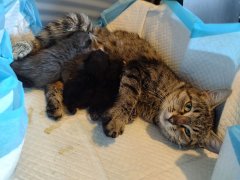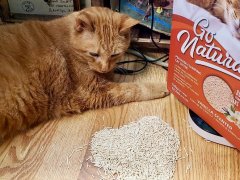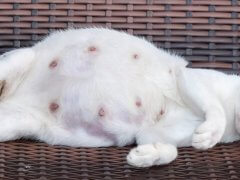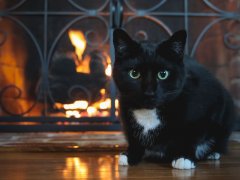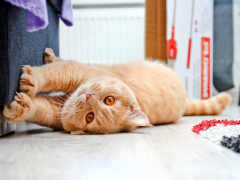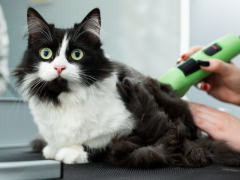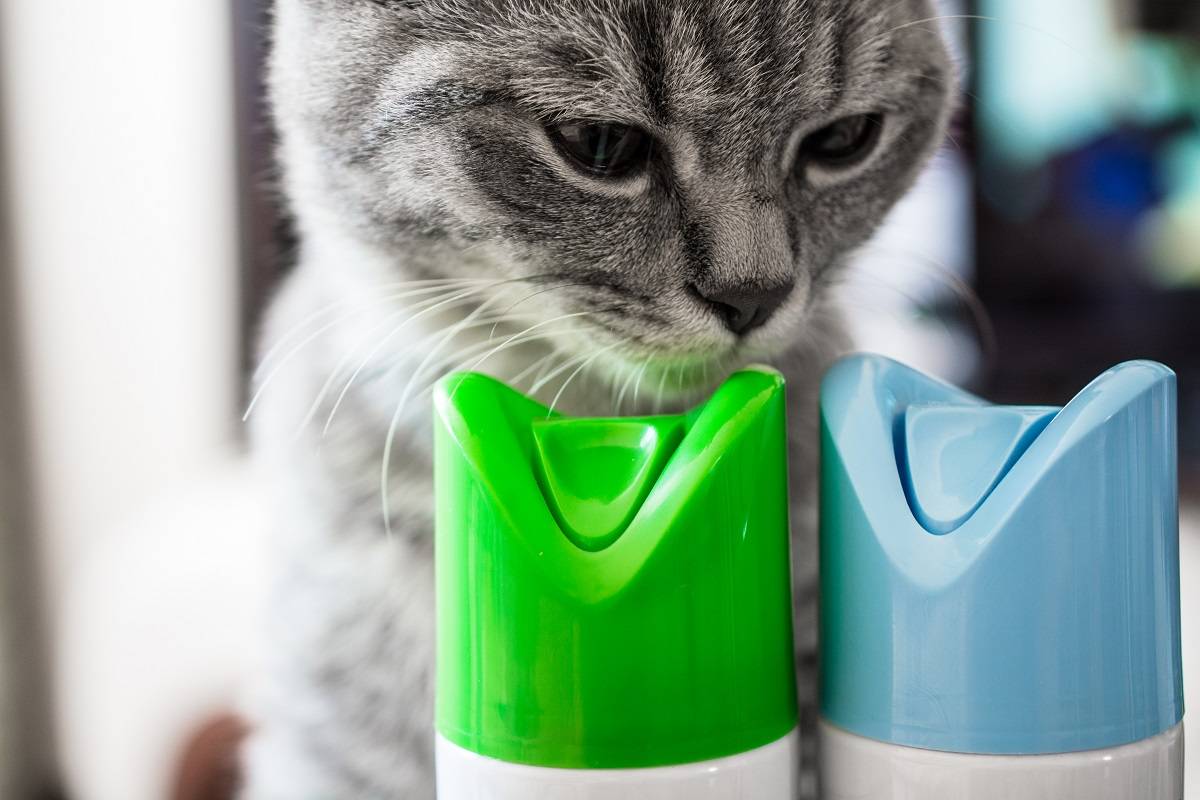
Mikhail Romanov / Shutterstock.com
With all the funky aromas that come with sharing your home with cats, it’s no wonder that many cat owners turn to air fresheners. They work by releasing a pleasant smell that masks the less pleasant ones—like the litter box! But unfortunately, air fresheners also release a range of hazardous chemicals that can pose some serious health risks to us and our pets. This is the case even if the air fresheners are labeled as “green” or “organic.”
Let’s explore exactly what goes into air fresheners, why they can be so detrimental to your cat’s health, and what the safe alternatives might be.
What Do Air Fresheners Contain?
Air fresheners release more than 100 different types of chemicals, including volatile organic compounds (VOCs). VOCs are chemicals that turn rapidly into gases from a solid or liquid form. They are found in many types of household products, from paint strippers and fuels to cigarette smoke and pesticides. These are, of course, not products you’d ever think about purposely exposing your cat to.
According to the United States Environmental Protection Agency (USEPA), VOCs have been known to cause symptoms from headaches and nausea to liver, kidney, and neurological damage. The USEPA also states that some VOCs are linked to cancers in both people and animals.
Yet, despite the risks, companies that manufacture air fresheners are not required to disclose all the ingredients—and they generally do not. Studies have found that fewer than 10% of volatile ingredients are typically even listed on the labels or data sheets of common air fresheners. Instead, companies tend to list ingredients that sound natural, such as “organic perfume” and “water.” However, tests looking at a wide range of air fresheners (from room sprays to plug-ins and diffusers) found that they all released potentially hazardous chemicals.
Worryingly, there was no difference found in those products claiming to be “green,” “organic,” or “all-natural.” So, overall, it is best to assume that no air freshener is safe to use around your cat.
Is There Such a Thing as a Cat-Friendly Air Freshener?
Unfortunately, there aren’t any specific studies looking at the impact of air fresheners on cats. So we have to rely on personal experience, as well as what we can learn from the extensive research on the risks of air fresheners to people. A study concerning air fresheners and indoor built environments found that air fresheners (even at low levels) are associated with a wide range of health problems in people, including:
- Migraines
- Asthma attacks
- Breathing and respiratory difficulties
- Skin problems
- Diarrhea
- Neurological problems
- Ventricular fibrillation (a life-threatening heart condition)
- Certain types of cancer
Another study published in the National Library of Medicine analyzed emissions from top-selling air fresheners and laundry detergents, identifying an average of 17 volatile organic compounds (VOCs) per product, some of which are classified as toxic or hazardous
Sadly, as a veterinarian, I have seen a similar range of symptoms in cats as are found in people. Given the sensitivity of our cats’ noses, I suspect that they are even more susceptible to the risks of air fresheners than humans are. Cats with underlying health problems are more likely to be impacted. In particular, cats with breathing problems like asthma are most susceptible. It is safest to avoid air fresheners completely.
Signs Your Cat Is Having a Reaction to an Air Freshener
So, what might you notice if your cat is exposed to air fresheners? The signs of toxic reactions to air fresheners can vary from immediate to long-term effects. Symptoms I have seen in cats exposed to air fresheners include:
- Sneezing
- Coughing
- Wheezing or coughing
- Irritation of eyes, nose, mouth, or throat
- Salivating (drooling)
- Breathing difficulties
- Weakness
- Dizziness or loss of coordination
- Vomiting
- Diarrhea
- Lethargy
- Lack of appetite
If your cat becomes unwell after being exposed to an air freshener, remove them from that area immediately and ventilate the room. If their symptoms don’t resolve quickly, take them to see your veterinarian.
It isn’t only the immediate effects of air fresheners that can be a problem. Just like in people, air fresheners are also linked with long-term issues. This includes worsening respiratory issues (such as asthma), as well as damage to the liver, kidney, and central nervous system. Air fresheners could even increase your cat’s risk of cancer.
What to Do if Your Cat Eats an Air Freshener
Tiny particles of air freshener in the air can make your cat ill. So, what happens if they lick or even eat air freshener? Unfortunately, ingesting air fresheners can be serious. If you believe your cat might have ingested air freshener, seek veterinary advice immediately. You can also contact the ASPCA Animal Poison Control Center advice line at 888-426-4435.
Safe Alternatives to Air Fresheners
Living with pets can mean living with a few funky aromas. From litter boxes to smelly food, it’s no wonder many pet owners turn to air fresheners. The good news is that many safe and effective alternatives are better for you and your cat’s health—and still keep your home smelling fresh.
An important note here: As the risks of traditional air fresheners are becoming more widely known in people, the market has shifted toward essential oils as a safer alternative. However, cats are particularly sensitive to many essential oils. So, unfortunately, essential oils could be even more toxic to your cat than air fresheners.
Here are some nontoxic, safe ways to freshen your (and your cat’s) home.
Ventilation
Ventilation is key when it comes to keeping your home smelling fresh and removing bad smells. It can be as straightforward as cracking open the windows and replacing the stale air with the fresh air from outside. This is much safer than adding chemicals to mask the smells. Just be sure to only open doors or windows that are safe for your cat.
Automatic Litter Boxes
The litter box can be one of the main offenders when it comes to unwanted pet odors. So, ensuring your cat’s litter box is always fresh is one of the best alternatives. But when life is busy, it can be tricky to clean it every single time your cat goes. This is where automatic, self-cleaning litter boxes come in. They clean the box after every visit, keeping it fresh for both you and your cat.
Also Read: The 6 Best Automatic Self-Cleaning Litter Boxes in 2024
Cat Litter Deodorizers
If an automatic litter box isn’t an option for you, a litter box deodorizer could be a great (and cheaper) alternative. Here at Cats.com we have done the hard work for you by extensively researching and testing the best cat litter deodorizer out there.
Safe Household Alternatives
Household products like baking soda, vinegar, and activated charcoal can make great natural air fresheners. They work by absorbing unwanted smells rather than masking them and are all safe to use around cats. So, next time you find yourself reaching for the air freshener, try placing a bowl of vinegar or baking soda near the offending smell.
Air Purifying Plants
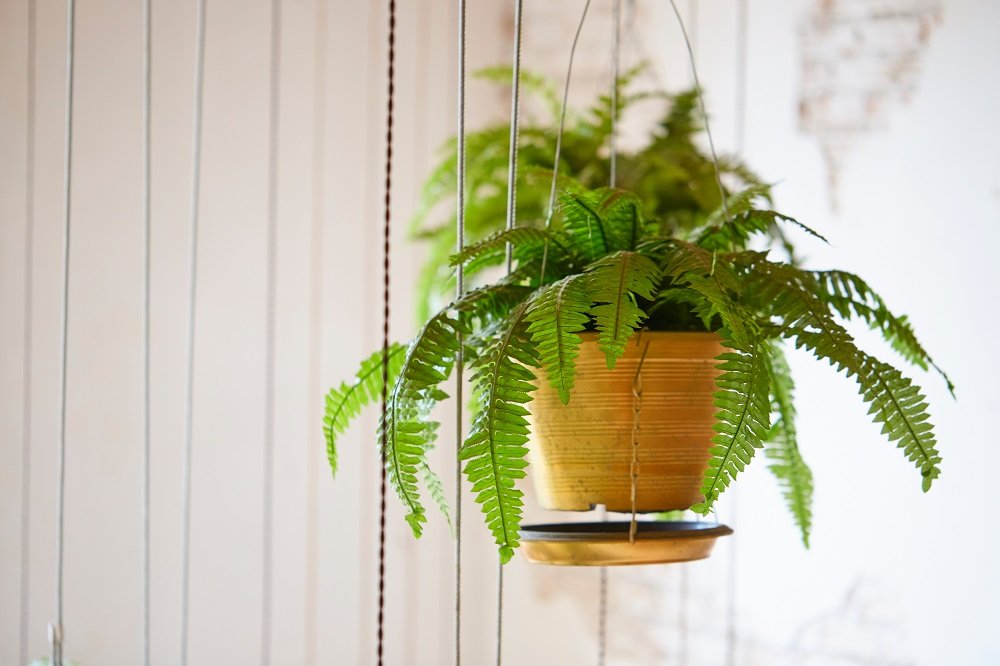
Air-purifying plants like Boston ferns can be a safe alternative to air fresheners—and they look great, too. JADEZMITH / Shutterstock.com
As well as instantly adding to the ambiance of your home, many house plants purify the air by filtering out toxic chemicals. There are lots of cat-safe options, including bamboo, spider plants, and the Boston fern, listed by NASA as one of the best air-purifying plants! You could also try using air-purifying herbs like rosemary.
Also Read: 21 Cat-Friendly Flowers You Can Buy or Grow
Air Purifiers
If you’re after an effective solution and happy to pay a little more, an air purifier might be for you. These clever machines filter the air in your home, removing everything from smells to toxic chemicals (including VOCs), pollens, allergens, and even some bacteria and viruses. So, not only do they keep your home smelling fresh, but they might improve your cat’s health, too. If your cat suffers from allergies or respiratory issues, an air purifier could be an excellent investment.
Frequently Asked Questions
Can scents be toxic to cats?
Yes, many scents are toxic to cats. In particular, many types of essential oils are very toxic for cats, particularly if they accidentally ingest them. Scents that are known to be dangerous for cats include ylang ylang, lemongrass, tea tree oil, and types of mints. Be sure to check before introducing any new scent to your home.
Are there pet-safe air fresheners?
Air fresheners may be marketed as "pet-safe," but companies aren't required to disclose the full list of ingredients. This makes it difficult to know if it is safe for your pet. Alternatives such as air purifiers and plants are the only safe options for pets.
-
Steinemann, A. (2017). Ten questions concerning air fresheners and indoor built environments. Building and Environment, 111, 279–284.
-
Steinemann, A. (2009). Fragranced consumer products and undisclosed ingredients. Environmental Impact Assessment Review, 29(1), 32–38.
-
Volatile organic compounds’ impact on indoor air quality | US EPA. (2023, August 15). US EPA.
